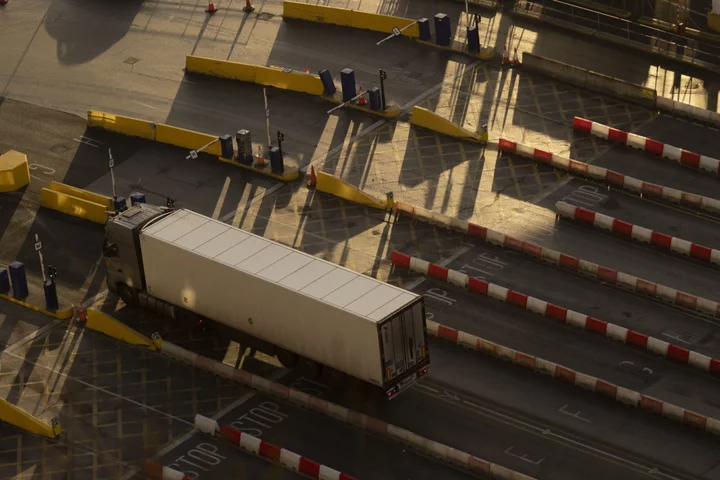The UK is weighing options to blunt the cost of post-Brexit border checks on European food imports due to start in January over fears they could exacerbate the country’s inflation problem.
Rishi Sunak’s government has in recent weeks been studying the potential impact of the measures, which include physical examinations and extra paperwork and are set to be phased-in from October, people familiar with the discussions said. The controls will add to costs for importers that may then be passed onto consumers, even as the Bank of England struggles to get stubbornly high inflation under control.
The checks on agricultural food products and livestock, which the UK committed to imposing as part of its 2020 Brexit agreement with the European Union, have already been postponed five times. The government delayed the measures for more than a year after concluding that they would add at least £1 billion ($1.3 billion) in annual costs to British importers.
The Treasury and the Department for Environment, Food and Rural Affairs are analyzing options to bring down the costs, said the people, who asked not to be named to discuss internal deliberations. Earlier this year, the government said it had a plan that would reduce costs by around £400 million.
Defra denied any plan to delay the checks a sixth time, reiterating in a statement Thursday its previous commitment to implement certification for relevant consignments from October and physical checks from January. “We expect to publish the final timeline for introducing new import controls shortly, to protect UK producers and consumers from dangerous and costly disease outbreaks,” the department said.
Inflation in the UK has defied the BOE’s efforts to rein in prices, prompting the central bank to unexpectedly raise interest rates by half a percentage point last week. Food has emerged as a greater contributer to inflation than energy, complicating Sunak’s promise to halve it this year.
The government “concluded that it would be wrong to impose new administrative requirements on businesses who may pass-on the associated costs to consumers already facing pressures on their finances,” the Cabinet Office said while announcing a previous delay to the checks last year.
In April, the government again quietly delayed the introduction of the measures, saying it would introduce health certification requirements on imports from the EU this October, and start physical inspections in January. Safety-and-security declarations for EU imports would come into force from October 2024, it said.
Imposing such checks will spotlight Brexit’s impact on local prices, with a London School of Economics study in May blaming one-third of UK food inflation since 2019 on the decision to leave the single market. The ruling Conservative Party backs Brexit and Sunak was a prominent early supporter.
While British exports to the EU are subject to checks, the UK has repeatedly allowed grace periods for checks on imports. This week, the Fresh Produce Consortium warned the border checks will add costs, delays and disruption which could “materially contribute towards consumer inflation.”
The EU hasn’t retaliated against the repeated delays because the grace periods only impact produce leaving its trading bloc. Even so, the UK could expose itself to challenges at the World Trade Organization if any third party feels it’s goods are being treated unfairly compared with those from Europe.
Author: Ellen Milligan, Joe Mayes and Alex Wickham

